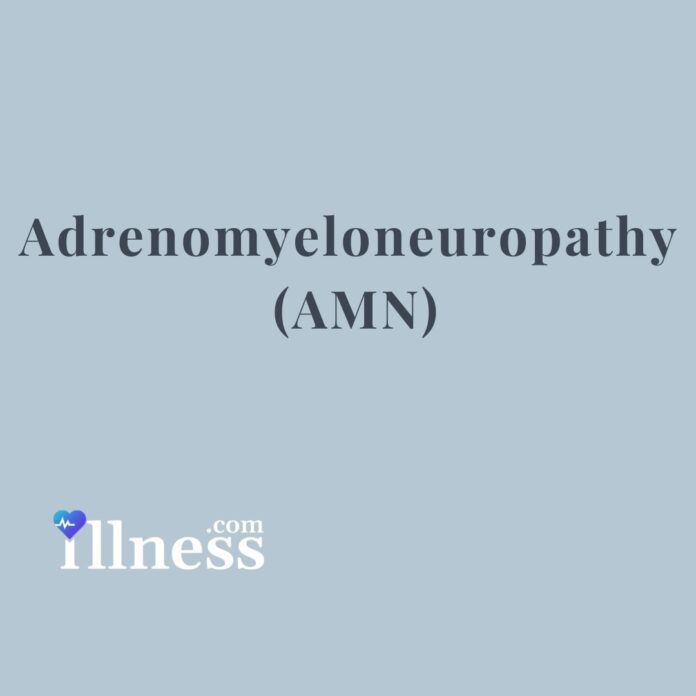Overview Of Adrenomyeloneuropathy (AMN)
Adrenomyeloneuropathy (AMN) is a specific genetic X-linked form of adrenoleukodystrophy, which are a group of disorders that interfere with the breakdown of certain types of fats in the body. These types of disorders are often genetic, and passed down through family lines.
Commonly Associated With
Childhood cerebral adrenoleukodystrophy, X-linked Adrenoleukodystrophy (ALD), and Schilder-Addison Complex
Causes Of Adrenomyeloneuropathy (AMN)
Adrenomyeloneuropathy (AMN) causes a buildup of overly long fatty acid chains within the nervous system, testes, and adrenal glands. Buildup within these parts of the body interferes with their normal function.
AMN is most often passed down as an X-linked genetic trait from parent to child. X-linked means that the gene for the disorder is on the X chromosome, which explains why it affects males most often. They only have one copy of the X gene, as opposed to two for females. This increases their chances for developing the disorder significantly. Some women can be carrier for AMN, and may experience milder forms of the disorder. AMN affects 1 in 20,000 people, regardless of race.
There are two major forms of AMN, those with cerebral involvement and those without. AMN without cerebral involvement is the more minor of the two forms, and has a significantly better prognosis and a much more limited effect on the person’s daily life and activities. This form occurs in around 50% of AMN cases. The other form, with cerebral involvement, is more severe with a significantly worse prognosis. In 20% of these cases, brain-related symptoms can be very progressive and lead to serious symptoms that can cause death or near-complete disability in some cases.
Symptoms Of Adrenomyeloneuropathy (AMN)
- Changes to their walking pattern or difficulty walking are the most common first symptoms of AMN
- Difficulty speaking or forming words, typically caused by impaired function of the muscles normally used in speaking (dysarthria)
- Mild peripheral neuropathy
- Slowly progressing stiffness and weakness of the legs, otherwise known as spastic paraparesis
- Unintentional weight loss
- The loss of the person’s ability to coordinate their muscle movements, also known as ataxia
- Nausea
- The development of excessive muscle tone, known as hypertonia.
- Impotence/sexual dysfunction in males – this symptom is relatively uncommon compared to the others, and can be diagnosed by measuring Plasma testosterone levels. The cause is either by interference within the testes themselves or involvement of the spinal cord.
- Visual disturbances and defects
- Seizures
- Adrenal insufficiency – normally, the adrenal glands, located right above the kidneys, are in charge of releasing important hormones, such as cortisol and adrenaline. These hormones are necessary for controlling a person’s heart rate, blood pressure, sexual development and reproduction. When adrenal insufficiency occurs, the body does not produce enough of these necessary hormones to properly control these processes. Adrenal insufficiency occurs in around 70% of males with AMN
- Behavioral changes
- Dysfunction of the bladder
Exams and Tests
Tests for AMN can include:
- A skin biopsy
- A chromosome study to check for mutations (changes) in the ABCD1 gene
- A blood test to check their levels of adrenal hormones and very-long-chain fatty acids
- An MRI of the head area
Treatment Of Adrenomyeloneuropathy (AMN)
A direct treatment for AMN does not currently exist. A bone marrow transplant may prevent further worsening of the condition, but it is not a cure. However, it is possible to treat adrenal insufficiency using steroids such as cortisol.
Making sure to monitor adrenal gland function is a very important aspect of care for AMN, along with supportive care geared towards comfort and improving quality of life.
Outlook (Prognosis)
The prognosis for AMN can vary quite a bit depending on the severity of the condition and whether or not it has cerebral involvement. Those with cerebral involvement (brain and spinal cord affected) have a significantly worse prognosis than those without. In around 20% of these cases, the person’s brain involvement worsens over time (severely progressive) and can lead to physical disabilities, abnormal behaviors, or even death in some cases.
Those without cerebral involvement, where only the spinal cord is involved, tend to have milder symptoms, and can live fairly normal lives so long as they have regular physical therapy, counseling, and bladder control management services.
Possible Complications
An adrenal crisis can occur, which if left untreated could lead to a vegetative state.
When to Contact a Medical Professional
Contact a health care provider if:
- You or someone you know develops symptoms of adrenomyeloneuropathy.
- Someone with diagnosed AMN is experiencing symptoms of adrenal insufficiency, as they need immediate treatment.
Prevention Of Adrenomyeloneuropathy (AMN)
There is no current method to prevent adrenomyeloneuropathy at this time, other than genetic counseling. Genetic counseling is recommended for couples with a family history of this disorder, even if they do not have it themselves. Mothers of sons with AMN have around an 85% chance of being a carrier for the disorder.
Prenatal testing for AMN is also available, and is done via chorionic villus sampling or amniocentesis. Each of these tests are checking for either a known gene that causes AMN or for very long chains of fatty acids.



